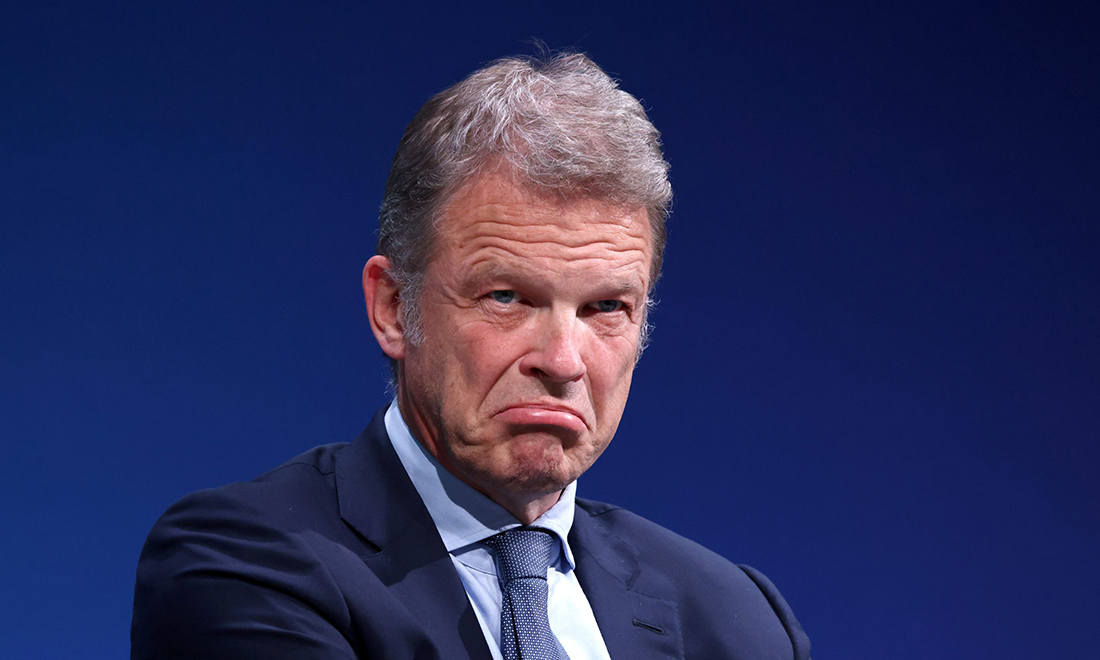
德意志銀行首席執(zhí)行官克里斯蒂安·澤溫認(rèn)為,德國人真正需要做的是更加努力地工作。
據(jù)彭博社報(bào)道,他上周三在法蘭克福的一次會(huì)議上談到德國目前的經(jīng)濟(jì)困境時(shí)說:“讓我們回到和歐盟平均水平一樣努力工作的狀態(tài)吧。”
德國最大的公司大眾汽車(Volkswagen)上周占據(jù)了各大媒體的頭條,此前該公司表示正在考慮關(guān)閉工廠,這是歷史上首次這樣做。另外,美國科技公司英特爾(Intel)表示,正在重新考慮其價(jià)值320億美元的德國新工廠計(jì)劃。
這些事件是多年來經(jīng)濟(jì)增長緩慢、工業(yè)訂單萎縮和歷史投資不足的后果。隨著極右翼政黨 “德國選擇黨”(Alternative for Germany)在地區(qū)選舉中占據(jù)上風(fēng),德國的政治局勢可能也會(huì)發(fā)生變化,從而加劇現(xiàn)有的緊張局勢。
澤溫指出歐盟和德國工作時(shí)間的差異是恰如其分的。2023年的官方數(shù)據(jù)顯示,歐盟的每周平均工作時(shí)間為36.1小時(shí),而德國僅為34小時(shí)。
其他歐洲國家的工作時(shí)間也超過了地區(qū)平均水平,如希臘的每周工作時(shí)間為39.8小時(shí)。德國的工業(yè)競爭對(duì)手美國的員工平均工作時(shí)間為36.4小時(shí),接近歐盟的平均水平。
澤溫自2018年以來一直領(lǐng)導(dǎo)這家德國銀行業(yè)巨頭,過去曾敦促進(jìn)行政策層面的變革,以防止該國成為“歐洲病夫”。他說,如今投資者開始質(zhì)疑該國還擊的能力。
澤溫表示:“一年多來,投資者一直在告訴我們,他們懷疑德國和歐洲的工作表現(xiàn)能力,甚至懷疑工作表現(xiàn)意愿。我們只需告訴我們的同胞,我們必須再做更多工作。”
德意志銀行的代表沒有立即回復(fù)《財(cái)富》雜志的置評(píng)請(qǐng)求。
就在澤溫發(fā)表上述言論的幾個(gè)月前,挪威主權(quán)財(cái)富基金首席執(zhí)行官尼古拉·坦根(Nicolai Tangen)指出,美國人比歐洲人工作更努力,也更有野心。雖然將工作時(shí)間與國內(nèi)生產(chǎn)總值增長掛鉤具有挑戰(zhàn)性,但工作時(shí)間延長有助于提高經(jīng)濟(jì)產(chǎn)出,而且歐洲員工工作時(shí)間較短加劇了人們對(duì)歐洲失去對(duì)美國競爭力的擔(dān)憂。
德國為何面臨危機(jī)?
事情并非總是如此。在德國的黃金時(shí)期,它曾是工業(yè)強(qiáng)國和推動(dòng)歐盟增長的引擎。就資金而言,其制造業(yè)實(shí)力足以與其他任何主要經(jīng)濟(jì)體一較高下。德國也是該地區(qū)一些大型公司的所在地,如寶馬(BMW)、大眾和西門子(Siemens)。
但近年來,德國經(jīng)濟(jì)在一連串危機(jī)中蹣跚前行。俄烏沖突引發(fā)的能源危機(jī)導(dǎo)致價(jià)格飆升,而高利率抑制了建筑活動(dòng),損害了當(dāng)?shù)氐南M(fèi)能力。德國最大的貿(mào)易伙伴中國并沒有像人們希望的那樣從疫情中復(fù)蘇,這導(dǎo)致德國經(jīng)濟(jì)停滯不前,并引發(fā)了人們對(duì)“限制工業(yè)化”的擔(dān)憂。
導(dǎo)致德國經(jīng)濟(jì)狀況惡化的其他因素還包括勞動(dòng)生產(chǎn)率停滯不前、勞動(dòng)力老齡化以及政府的繁文縟節(jié)。
在一度領(lǐng)先的汽車制造領(lǐng)域,德國也在不經(jīng)意間落后于中國。德國的主要汽車制造商最初并沒有熱情擁抱電動(dòng)汽車計(jì)劃,但最終宣布了進(jìn)軍電動(dòng)汽車的宏大計(jì)劃。此后,他們又收回了這些雄心壯志。
德國經(jīng)歷了幾次當(dāng)頭一棒的時(shí)刻。例如,德國化工巨頭巴斯夫(BASF)沒有留在國內(nèi),轉(zhuǎn)而在中國投資100億美元新建工廠。該公司時(shí)任首席執(zhí)行官薄睦樂(Martin Brudermüller)早些時(shí)候提到的擔(dān)憂是“盈利能力已無法達(dá)到應(yīng)有的水平”。該公司還削減了數(shù)千個(gè)工作崗位。
一場不可避免的風(fēng)暴正在醞釀之中,但德國需要利用自身的優(yōu)勢來擺脫困境。一些關(guān)鍵的經(jīng)濟(jì)因素(如失業(yè)率)得到控制,這對(duì)德國有所幫助。但還有很長的路要走——如果澤溫的評(píng)估是準(zhǔn)確的,也許要從德國人更加努力地工作開始。
資本集團(tuán)(Capital Group)經(jīng)濟(jì)學(xué)家羅伯特·林德(Robert Lind)今年早些時(shí)候在一份報(bào)告中寫道:“毋庸置疑,德國的經(jīng)濟(jì)貢獻(xiàn)對(duì)歐盟至關(guān)重要,尤其是在歐洲試圖平息對(duì)經(jīng)濟(jì)增長疲軟的擔(dān)憂之際。”(財(cái)富中文網(wǎng))
譯者:中慧言-王芳
德意志銀行首席執(zhí)行官克里斯蒂安·澤溫認(rèn)為,德國人真正需要做的是更加努力地工作。
據(jù)彭博社報(bào)道,他上周三在法蘭克福的一次會(huì)議上談到德國目前的經(jīng)濟(jì)困境時(shí)說:“讓我們回到和歐盟平均水平一樣努力工作的狀態(tài)吧。”
德國最大的公司大眾汽車(Volkswagen)上周占據(jù)了各大媒體的頭條,此前該公司表示正在考慮關(guān)閉工廠,這是歷史上首次這樣做。另外,美國科技公司英特爾(Intel)表示,正在重新考慮其價(jià)值320億美元的德國新工廠計(jì)劃。
這些事件是多年來經(jīng)濟(jì)增長緩慢、工業(yè)訂單萎縮和歷史投資不足的后果。隨著極右翼政黨 “德國選擇黨”(Alternative for Germany)在地區(qū)選舉中占據(jù)上風(fēng),德國的政治局勢可能也會(huì)發(fā)生變化,從而加劇現(xiàn)有的緊張局勢。
澤溫指出歐盟和德國工作時(shí)間的差異是恰如其分的。2023年的官方數(shù)據(jù)顯示,歐盟的每周平均工作時(shí)間為36.1小時(shí),而德國僅為34小時(shí)。
其他歐洲國家的工作時(shí)間也超過了地區(qū)平均水平,如希臘的每周工作時(shí)間為39.8小時(shí)。德國的工業(yè)競爭對(duì)手美國的員工平均工作時(shí)間為36.4小時(shí),接近歐盟的平均水平。
澤溫自2018年以來一直領(lǐng)導(dǎo)這家德國銀行業(yè)巨頭,過去曾敦促進(jìn)行政策層面的變革,以防止該國成為“歐洲病夫”。他說,如今投資者開始質(zhì)疑該國還擊的能力。
澤溫表示:“一年多來,投資者一直在告訴我們,他們懷疑德國和歐洲的工作表現(xiàn)能力,甚至懷疑工作表現(xiàn)意愿。我們只需告訴我們的同胞,我們必須再做更多工作。”
德意志銀行的代表沒有立即回復(fù)《財(cái)富》雜志的置評(píng)請(qǐng)求。
就在澤溫發(fā)表上述言論的幾個(gè)月前,挪威主權(quán)財(cái)富基金首席執(zhí)行官尼古拉·坦根(Nicolai Tangen)指出,美國人比歐洲人工作更努力,也更有野心。雖然將工作時(shí)間與國內(nèi)生產(chǎn)總值增長掛鉤具有挑戰(zhàn)性,但工作時(shí)間延長有助于提高經(jīng)濟(jì)產(chǎn)出,而且歐洲員工工作時(shí)間較短加劇了人們對(duì)歐洲失去對(duì)美國競爭力的擔(dān)憂。
德國為何面臨危機(jī)?
事情并非總是如此。在德國的黃金時(shí)期,它曾是工業(yè)強(qiáng)國和推動(dòng)歐盟增長的引擎。就資金而言,其制造業(yè)實(shí)力足以與其他任何主要經(jīng)濟(jì)體一較高下。德國也是該地區(qū)一些大型公司的所在地,如寶馬(BMW)、大眾和西門子(Siemens)。
但近年來,德國經(jīng)濟(jì)在一連串危機(jī)中蹣跚前行。俄烏沖突引發(fā)的能源危機(jī)導(dǎo)致價(jià)格飆升,而高利率抑制了建筑活動(dòng),損害了當(dāng)?shù)氐南M(fèi)能力。德國最大的貿(mào)易伙伴中國并沒有像人們希望的那樣從疫情中復(fù)蘇,這導(dǎo)致德國經(jīng)濟(jì)停滯不前,并引發(fā)了人們對(duì)“限制工業(yè)化”的擔(dān)憂。
導(dǎo)致德國經(jīng)濟(jì)狀況惡化的其他因素還包括勞動(dòng)生產(chǎn)率停滯不前、勞動(dòng)力老齡化以及政府的繁文縟節(jié)。
在一度領(lǐng)先的汽車制造領(lǐng)域,德國也在不經(jīng)意間落后于中國。德國的主要汽車制造商最初并沒有熱情擁抱電動(dòng)汽車計(jì)劃,但最終宣布了進(jìn)軍電動(dòng)汽車的宏大計(jì)劃。此后,他們又收回了這些雄心壯志。
德國經(jīng)歷了幾次當(dāng)頭一棒的時(shí)刻。例如,德國化工巨頭巴斯夫(BASF)沒有留在國內(nèi),轉(zhuǎn)而在中國投資100億美元新建工廠。該公司時(shí)任首席執(zhí)行官薄睦樂(Martin Brudermüller)早些時(shí)候提到的擔(dān)憂是“盈利能力已無法達(dá)到應(yīng)有的水平”。該公司還削減了數(shù)千個(gè)工作崗位。
一場不可避免的風(fēng)暴正在醞釀之中,但德國需要利用自身的優(yōu)勢來擺脫困境。一些關(guān)鍵的經(jīng)濟(jì)因素(如失業(yè)率)得到控制,這對(duì)德國有所幫助。但還有很長的路要走——如果澤溫的評(píng)估是準(zhǔn)確的,也許要從德國人更加努力地工作開始。
資本集團(tuán)(Capital Group)經(jīng)濟(jì)學(xué)家羅伯特·林德(Robert Lind)今年早些時(shí)候在一份報(bào)告中寫道:“毋庸置疑,德國的經(jīng)濟(jì)貢獻(xiàn)對(duì)歐盟至關(guān)重要,尤其是在歐洲試圖平息對(duì)經(jīng)濟(jì)增長疲軟的擔(dān)憂之際。”(財(cái)富中文網(wǎng))
譯者:中慧言-王芳
What Germans really need to do is work harder, according to Deutsche Bank CEO Christian Sewing.
“Let’s just go back to working as hard as the EU average,” he said at a Frankfurt conference on Wednesday, addressing the country’s current economic woes, Bloomberg reported.
Germany’s largest company, Volkswagen, has dominated the headlines this week after it said it was considering its first-ever factory closures. Separately, Intel, the American tech company, said it was rethinking its new German factory worth $32 billion.
These events are the aftereffect of years of sluggish economic growth, shrinking industrial orders, and historical underinvestment. Adding to the existing tensions, the country might also see political change on the horizon, with the far-right party Alternative for Germany gaining ground in regional elections.
Sewing is right to point out the disparity in EU and German working hours. Official data from 2023 suggest that the bloc’s average weekly work time is 36.1 hours, while Germany’s is only 34 hours.
Other European countries exceed the regional average, such as Greece, where the workweek lasts 39.8 hours. Workers at Germany’s industrial competitor, the U.S., labor for 36.4 hours on average—closer to the EU average.
Sewing has led the German banking giant since 2018 and has urged policy-level changes in the past to prevent the country from becoming known as “the sick man of Europe.” Now, he says, investors are beginning to question the country’s ability to fight back.
“Investors have been telling us for more than a year that they doubt Germany’s and Europe’s ability to perform, and even worse, the will to perform,” Sewing said. “We simply have to tell our fellow citizens that we have to do more again.”
Representatives at Deutsche Bank didn’t immediately return Fortune’s request for comment.
Sewing’s comments come just months after the Norwegian sovereign wealth fund chief, Nicolai Tangen, pointed out that Americans worked harder and were more ambitious than Europeans. While it’s challenging to link working hours to GDP growth, they contribute to economic output and feed into worries about Europe losing its competitiveness with the U.S.
Why is Germany facing a crisis?
Things weren’t always this way. During Germany’s golden days, it was an industrial powerhouse and the engine driving the EU’s growth. Its manufacturing heft could have given any other major economy a run for its money. Germany is also home to some of the biggest companies in the region, such as BMW, Volkswagen, and Siemens.
But its economy has limped through a string of crises in recent years. An energy crisis spurred by Russia’s invasion of Ukraine has caused prices to spike, while high interest rates have held back construction activity and hurt local spending power. Germany’s largest trade partner, China, hasn’t rebounded from COVID-19 as hoped, contributing to its economic plateau and sparking concerns of “deindustrialization.”
Other factors that have worsened Germany’s condition include stagnant labor productivity, an aging workforce, and government red tape.
The country has also inadvertently fallen behind China in the car-making race it was once leading. Its key automakers initially remained tepid but eventually announced big plans to expand into electric vehicles. They have since retracted those ambitions.
Germany has had a few rude awakenings. For instance, its chemicals behemoth BASF turned to China to make a whopping $10 billion investment in a new facility instead of staying home. One of the concerns the company’s then-CEO Martin Brudermüller cited earlier was that “profitability is no longer anywhere near where it should be.” The company also cut thousands of jobs.
An inevitable storm is brewing, but Germany needs to capitalize on its strengths to pull itself out of the bind. It helps that some key economic factors, such as unemployment, are at bay. But there’s a long way to go—and if Sewing’s assessment is accurate, maybe it starts with Germans working harder.
“Undoubtedly, Germany’s economic contribution is vital to the EU, especially as Europe seeks to quell concerns around weaker growth,” Capital Group economist Robert Lind wrote in a note earlier this year.






